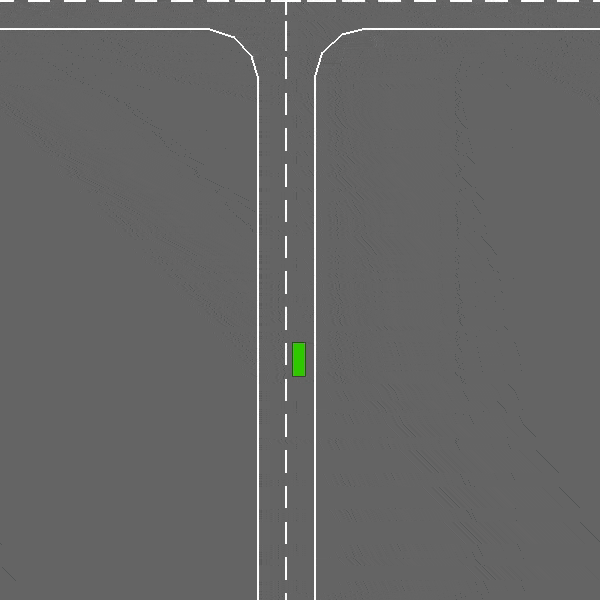Intersection¶
An intersection negotiation task with dense traffic.
Warning
It’s quite hard to come up with good decentralized behaviors for other agents to avoid each other. Of course, this could be achieved by sophisticated centralized schedulers, or traffic lights, but to keep things simple a rudimentary collision prediction was added in the behaviour of other vehicles.
This simple system sometime fails which results in collisions, blocking the way for the ego-vehicle. I figured it was fine for my own purpose, since it did not happen too often and it’s reasonable to expect the ego-vehicle to simply wait the end of episode in these situations. But I agree that it is not ideal, and I welcome any contribution on that matter.
Usage¶
env = gym.make("intersection-v0")
Default configuration¶
{
"observation": {
"type": "Kinematics",
"vehicles_count": 15,
"features": ["presence", "x", "y", "vx", "vy", "cos_h", "sin_h"],
"features_range": {
"x": [-100, 100],
"y": [-100, 100],
"vx": [-20, 20],
"vy": [-20, 20],
},
"absolute": True,
"flatten": False,
"observe_intentions": False
},
"action": {
"type": "DiscreteMetaAction",
"longitudinal": False,
"lateral": True
},
"duration": 13, # [s]
"destination": "o1",
"initial_vehicle_count": 10,
"spawn_probability": 0.6,
"screen_width": 600,
"screen_height": 600,
"centering_position": [0.5, 0.6],
"scaling": 5.5 * 1.3,
"collision_reward": IntersectionEnv.COLLISION_REWARD,
"normalize_reward": False
}
More specifically, it is defined in:
API¶
-
class
highway_env.envs.intersection_env.IntersectionEnv(config: dict = None)[source]¶ -
COLLISION_REWARD: float = -5¶
-
HIGH_SPEED_REWARD: float = 1¶
-
ARRIVED_REWARD: float = 1¶
-
ACTIONS: Dict[int, str] = {0: 'SLOWER', 1: 'IDLE', 2: 'FASTER'}¶
-
ACTIONS_INDEXES= {'FASTER': 2, 'IDLE': 1, 'SLOWER': 0}¶
-
classmethod
default_config() → dict[source] Default environment configuration.
Can be overloaded in environment implementations, or by calling configure(). :return: a configuration dict
-
_reward(action: int) → float[source]¶ Return the reward associated with performing a given action and ending up in the current state.
- Parameters
action – the last action performed
- Returns
the reward
-
_is_terminal() → bool[source]¶ The episode is over when a collision occurs or when the access ramp has been passed.
-
reset() → numpy.ndarray[source]¶ Reset the environment to it’s initial configuration
- Returns
the observation of the reset state
-
step(action: int) → Tuple[numpy.ndarray, float, bool, dict][source]¶ Perform an action and step the environment dynamics.
The action is executed by the ego-vehicle, and all other vehicles on the road performs their default behaviour for several simulation timesteps until the next decision making step.
- Parameters
action – the action performed by the ego-vehicle
- Returns
a tuple (observation, reward, terminal, info)
-
_make_road() → None[source]¶ Make an 4-way intersection.
- The horizontal road has the right of way. More precisely, the levels of priority are:
3 for horizontal straight lanes and right-turns
1 for vertical straight lanes and right-turns
2 for horizontal left-turns
0 for vertical left-turns
The code for nodes in the road network is: (o:outer | i:inner + [r:right, l:left]) + (0:south | 1:west | 2:north | 3:east)
- Returns
the intersection road
-
_make_vehicles(n_vehicles: int = 10) → None[source]¶ Populate a road with several vehicles on the highway and on the merging lane
- Returns
the ego-vehicle
-
_spawn_vehicle(longitudinal: float = 0, position_deviation: float = 1.0, speed_deviation: float = 1.0, spawn_probability: float = 0.6, go_straight: bool = False) → None[source]¶
-
property
has_arrived¶
-
__annotations__= {'ACTIONS': typing.Dict[int, str], 'ARRIVED_REWARD': <class 'float'>, 'COLLISION_REWARD': <class 'float'>, 'HIGH_SPEED_REWARD': <class 'float'>}¶
-
__module__= 'highway_env.envs.intersection_env'¶
-
